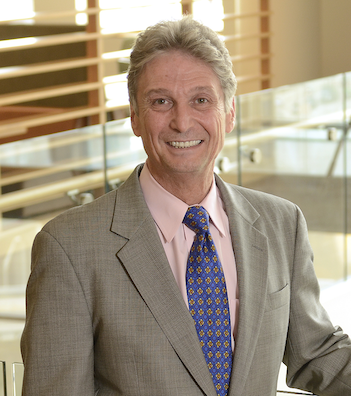
Richard Leach, a national expert on in vitro fertilization and an academic researcher in the Michigan State University College of Human Medicine, has been appointed chair of the Henry Ford Medical Group’s Department of Women’s Health Services. Leach will serve in a dual role and continue as chair of the Department of Obstetrics, Gynecology and Reproductive Biology for MSU’s College of Human Medicine.
The appointment is notable in that it is the first announcement made since Henry Ford Health System and MSU finalized their 30-year partnership in January. As part of the alignment, Henry Ford and MSU aim to transform health care, advance medical research and address health disparities.
In his Henry Ford Medical Group leadership role, Leach will oversee all clinical, research and administrative services for Women’s Health, which provides specialized and routine care in gynecology and breast health, obstetrics, infertility, cancer and pelvic health disorders. Women’s Health also offers a diverse group of certified midwives who work closely with Henry Ford obstetricians and gynecologists.
“I am thrilled to have Dr. Leach join the Medical Group in this leadership role,” said Steven Kalkanis, M.D., CEO of the Henry Ford Medical Group and senior vice president and chief academic officer.
“This role for Dr. Leach is seen as the start of joining the renowned clinical and applied research expertise at Henry Ford with the intellectual research power of MSU,” Kalkanis added. “Moreover, connecting Henry Ford’s premier academic Women’s Health Services and research with the resources of MSU’s Department of Obstetrics, Gynecology and Reproductive Biology will accelerate the delivery of unparalleled health services to all women and promoting health equity. This firmly establishes our Henry Ford-MSU affiliation as a top-five National Institutes of Health-funded program in the country.”
Leach, who is board certified in obstetrics and gynecology with subspecialty certification in reproductive endocrinology and infertility, will guide the Women’s Health Research program under the Henry Ford-MSU Health Sciences Center.
“MSU and Henry Ford are building a community of world-class experts, leaders and practitioners, like no other. This is the first step in this bold, new partnership between our two institutions,” said Norman J. Beauchamp Jr., executive vice president for Health Sciences at MSU and chair of the board for the Health Sciences Center. “With the appointment of Dr. Leach, our region will have access to a world-class leader dedicated to improving the lives of our communities. Research and education in women’s health are a priority for both of our institutions and we’re committed to being the first choice for women and families.”
Leach joined MSU in 2008 as the first researcher hired for the College of Human Medicine’s new women’s reproductive health research endeavor in Grand Rapids. Since that time, he recruited an elite team of researchers and, today, MSU is among the premier women’s health research institutions in the country. In 2020, the department’s researchers received nearly $10 million in NIH grants – the fifth largest among 68 similar departments nationwide – according to the nonprofit Blue Ridge Institute for Medical Research.
Leach earned his medical degree from Wayne State University and completed a residency in obstetrics and gynecology at Beaumont Health and a fellowship in reproductive endocrinology and infertility at the Mayo Clinic. He is a Fellow in the American College of Obstetrics and Gynecology, American College of Surgeons and American College of Clinical Endocrinologists.
The Henry Ford Medical Group, part of the Henry Ford Health System, is one of the largest group practices in the country with more than 1,800 physicians and researchers in more than 40 specialties. Physicians care for patients in Henry Ford hospitals and outpatient medical centers across Southeast Michigan and Jackson.
MSU has offered health care education for more than a century. Combined, the human health colleges – the College of Human Medicine, the College of Nursing and the College of Osteopathic Medicine – have nearly 2,000 medical students, 2,500 residents and fellows, more than 500 nursing students and 20,000 alumni, most of whom practice in Michigan. It is the only university in the country with on-campus schools graduating allopathic and osteopathic physicians, as well as nurses and veterinarians.